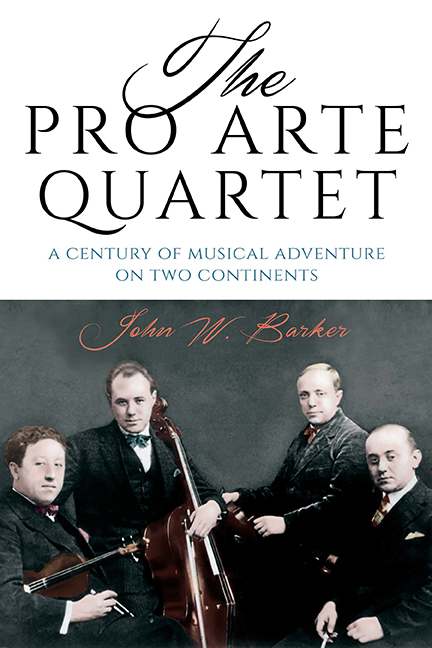Book contents
- Frontmatter
- Dedication
- Contents
- Preface
- Lists of Quartet Membership
- Introduction: Quartet Contexts
- 1 The Onnou Years, I (1912–31)
- 2 The Onnou Years, II (1932–40)
- 3 The Brosa Years (1940–44)
- 4 The Kolisch Years (1944–67)
- 5 The Paulu Years, I (1967–79)
- 6 The Paulu Years, II (1979–95)
- 7 The Perry Years (1995–Present)
- Conclusion: Retrospect and Prospects
- Appendixes
- Selected Bibliography
- Index A Composers
- Index B General
2 - The Onnou Years, II (1932–40)
Published online by Cambridge University Press: 10 June 2021
- Frontmatter
- Dedication
- Contents
- Preface
- Lists of Quartet Membership
- Introduction: Quartet Contexts
- 1 The Onnou Years, I (1912–31)
- 2 The Onnou Years, II (1932–40)
- 3 The Brosa Years (1940–44)
- 4 The Kolisch Years (1944–67)
- 5 The Paulu Years, I (1967–79)
- 6 The Paulu Years, II (1979–95)
- 7 The Perry Years (1995–Present)
- Conclusion: Retrospect and Prospects
- Appendixes
- Selected Bibliography
- Index A Composers
- Index B General
Summary
Reputation, Landmarks, and Crisis
By the end of 1931, the Quatuor Pro Arte had reached the full plateau of eminence; their ensemble was perfectly integrated, notable for precision and clarity. The four members played as one, instinctively, as a token of their total commitment to chamber music playing. Each of them undertook ventures (often as part of the group's concerts) into the realm of sonatas and occasional solo pieces. But they had long given up any sideline of orchestral playing, they no longer had to do theater theater work for subsistence, and their full commitment was to the group's identity and operations. They were more of a family to each other than they were to their own natural families.
All of them were married, and all but Onnou had children. Their balance of local performances in Brussels with relentless rounds of touring kept them exceedingly active from season to season. This became their burden: their travels on tight schedules strained the energies they wished to put into their performances, so as to sustain their group reputation. Yet they would attend postconcert receptions or linger to mingle with the audiences at the cost of reduced sleep before early departures the next mornings. As the years passed, the players could only spend a month at home in Brussels during the summers, and perhaps a brief time at Christmas. Otherwise, they consumed most of their lives “on the road,” living out of their luggage. Milhaud observed of their life that their schedule allowed them no time to visit the great museums and monuments of the European cities where they played: “They know only the concert hall, the train station, and the hotel room where they rehearse tirelessly.”
They were all in generally good health, and of mature ages. All but one of them (Onnou) were somewhat balding, prompting Tully Potter to call the group “Poirot Lunaire”—thereby committing a pun that combined the image of Agatha Christie's famous (balding) Belgian detective with the title of the Schoenberg work with which they were early involved.
We might well pause here to say something about these four men as individuals.
- Type
- Chapter
- Information
- The Pro Arte QuartetA Century of Musical Adventure on Two Continents, pp. 33 - 81Publisher: Boydell & BrewerPrint publication year: 2017

